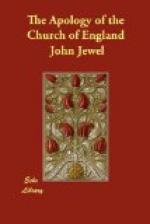And in speaking thus, we mean not to abase the Lord’s Supper, that it is but a cold ceremony only, and nothing to be wrought therein (as many falsely slander us we teach). For we affirm, that Christ doth truly and presently give His own self in His Sacraments; in Baptism, that we may put Him on; and in His Supper, that we may eat Him by faith and spirit, and may have everlasting life by His Cross and blood. And we say not, this is done slightly and coldly, but effectually and truly. For although we do not touch the body of Christ with teeth and mouth, yet we hold Him fast, and eat Him by faith, by understanding, and by the Spirit. And it is no vain faith which doth comprehend Christ: and that is not received with cold devotion, that is received with understanding, with faith, and with spirit. For Christ Himself altogether is so offered and given us in these mysteries, that we may certainly know we be flesh of His flesh, and bone of His bones; and that Christ “continueth in us, and we in Him.” And therefore in celebrating these mysteries, the people are to good purpose exhorted before they come to receive the Holy Communion, to lift up their hearts, and to direct their minds to heavenward: because He is there, by whom we must be full fed, and live. Cyril saith, when we come to receive these mysteries, all gross imaginations must quite be banished. The Council of Nice, as is alleged by some in Greek, plainly forbiddeth us to be basely affectioned, or bent toward the bread and wine, which are set before us. And, as Chrysostom very aptly writeth, we say, “that the body of Christ is the dead carcase, and we ourselves must be the eagles,” meaning thereby that we must fly high, if we will come unto the body of Christ. “For this table,” as Chrysostom saith, “is a table of eagles, and not of jays.” Cyprian also, “This bread,” saith he, “is the food of the soul, and not the meat of the belly.” And Augustine, “How shall I hold Him,” saith he, “which is absent? How shall I reach my hand up to heaven, to lay hold upon Him that sitteth there?” He answereth, “Reach hither thy faith, and then thou hast laid hold on Him.”
We cannot also away in our churches with the shows, and sales, and buying and selling of masses, nor the carrying about and worshipping of bread: nor such other idolatrous and blasphemous fondness: which none of them can prove that Christ or His Apostles did ever ordain, or left unto us. And we justly blame the bishops of Rome, who, without the word of God, without the authority of the holy fathers, without any example of antiquity, after a new guise, do not only set before the people the sacramental bread to be worshipped as God, but do also carry about the same upon an ambling horse, whithersoever themselves journey, as in old times the Persians’ fire, and the relics of the goddess Isis, were solemnly carried about in procession: and have brought the Sacraments of Christ to be used now as a stage play and a solemn sight: to the end, that men’s eyes should be fed with nothing else but with mad gazings and foolish gauds, in the self-same matter, wherein the death of Christ ought diligently to be beaten into our hearts, and wherein also the mysteries of our redemption ought with all holiness and reverence to be executed.




